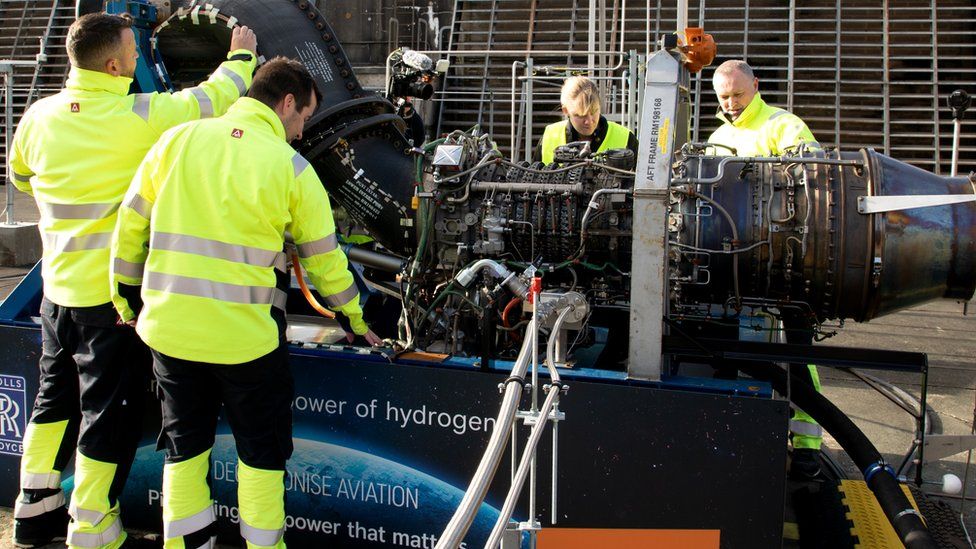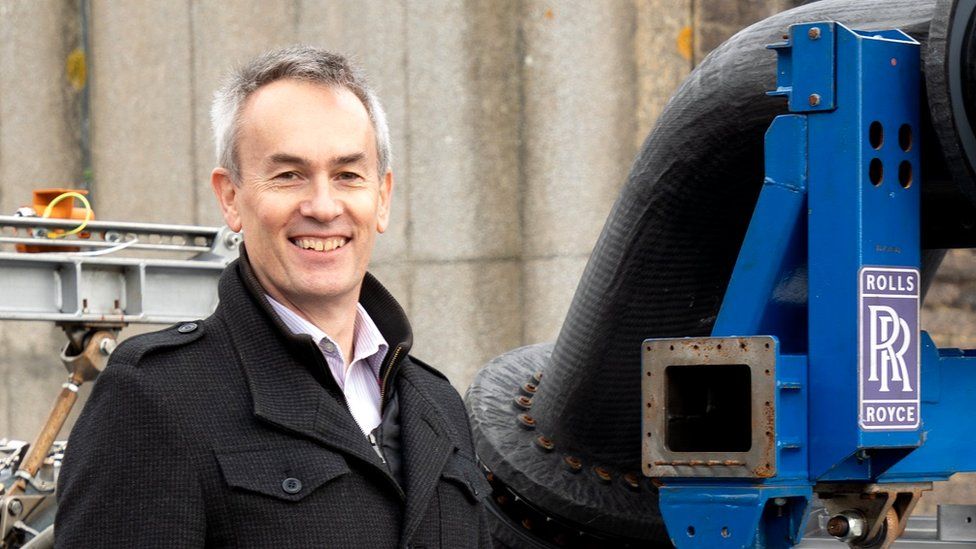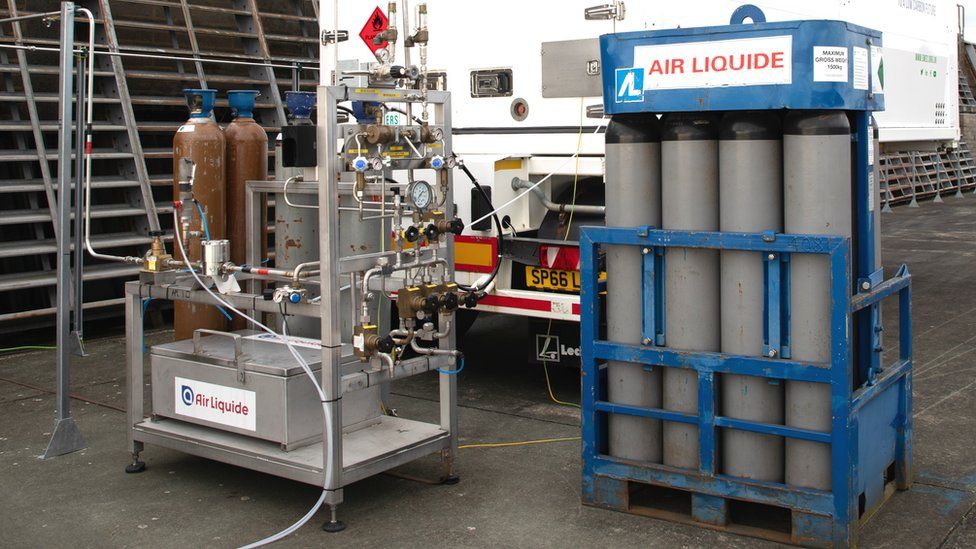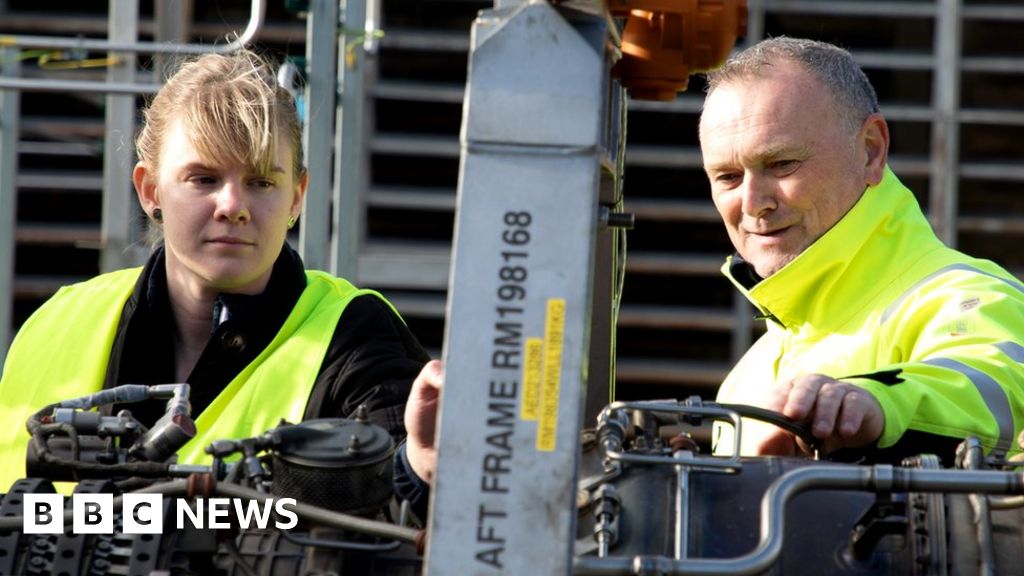..n if the thought o' road trippin in a fire breathin car-bomb isn't adventure enough, you can hold out for a spin round the friendly skies in this here hydrogen fueled plane prototype, running on a RR AE-2001A gas turbine engine.
Hopefully they too give passengers a generous five minutes to disembark or be rescued in event o issues. 
Rolls-Royce tests a jet engine running on hydrogen
Media caption,
Jet engine running on hydrogen
By Theo Leggett
Business correspondent, BBC News
In a windswept corner of a military site on Salisbury Plain a small aircraft jet engine is undergoing tests that could one day lead to huge changes within the aviation industry.
The engine itself is almost completely conventional. It is a Rolls-Royce AE-2100A gas turbine, a design used widely on regional aeroplanes around the world.
What is wholly unusual about it is the fuel being used. This is the first time a modern aircraft engine has ever been run on hydrogen.
Devoid of bodywork, with its intricate wiring and pipework exposed, it sits securely fastened to a sturdy test rig, while engineers cluster around an array of screens in the control room, a safe distance away.
The tests are being carried out by Rolls-Royce, in partnership with the airline easyJet.
Image source, Rolls-Royce
Image caption,
So far the engine has run at low speed on hydrogen
The immediate aim is a simple one - to show that it is possible to run and control a jet engine using hydrogen fuel, rather than conventional aviation fuels.
In the longer term, the plan is for hydrogen power to play a major role in allowing the aviation industry to continue growing, while cutting climate change emissions dramatically.
"The reason we're looking at hydrogen is really the drive for Net Zero," explains Alan Newby, director of aerospace technology at Rolls-Royce.
"Normally we would run this thing on kerosene. Kerosene is a hydrocarbon and therefore produces carbon dioxide when it burns.
"The beauty of looking at a fuel like hydrogen is that it doesn't contain any carbon and, therefore, when it burns it produces no CO2".
The project is being supported by easyJet, which has contributed several million pounds towards the initial trials.
Image source, Rolls-Royce
Image caption,
Hydrogen fuel is an "exciting" proposition says David Morgan, easyJet's chief operating officer
The company believes that hydrogen power offers the best route to reducing emissions from short haul aviation.
"We started a few years ago looking at what might power the aircraft of the future," explains David Morgan, easyJet's chief operating officer.
"We looked at battery technology, and it was quite clear that the battery technology was probably not going to do it for the large commercial aircraft that we fly.
"We've come to the conclusion that hydrogen is a very exciting proposition for us."
The advantage of hydrogen over batteries is that it provides much more power per kilogram. Batteries are simply too heavy to power larger planes.
Yet hydrogen aviation remains a very long way off. The tests carried out so far have simply shown that a jet engine using hydrogen can be started up and run at low speed.
Image source, Rolls-Royce
Image caption,
Hydrogen requires more elaborate storage and more space than jet fuel
But to go from there to building a wholly new engine, capable of powering a passenger aircraft safely will take a great deal more research - and significant investment.
The aircraft themselves will also need to be redesigned. Hydrogen, even in liquid form, takes up about four times as much space as the kerosene required to fly the same distance.
To make it into a liquid in the first place, it needs to be cooled to -253C. Then, before being burned, it must be turned back into a gas.
"There's a big change from the aircraft point of view," says Alan Newby at Rolls-Royce.
"They're going to have to have a tank containing the hydrogen. You've got to keep it at this really, really cold temperature.
"Then there's the issue of how you feed it through to the engine as well."
Image source, Rolls-Royce
Image caption,
Many engineering problems have to be solved to make hydrogen work as fuel, says Alan Newby from Rolls-Royce
The other key question is where the hydrogen itself comes from, because that will have a dramatic impact on the environmental benefits it can provide
The fuel used in the tests is so-called green hydrogen produced at the European Marine Energy Centre in the Orkney Islands.
It is made by using an electric current to split water into its components, hydrogen and oxygen. The electricity required is produced using wave and wind power. This makes it a very clean fuel.
But most of the hydrogen produced for industrial use today is obtained from a process which involves mixing high temperature steam with natural gas under high pressure.
However, this produces a considerable amount of carbon dioxide, which is then released into the atmosphere. It also requires a considerable amount of energy - which is often provided by burning fossil fuels.
One alternative is what's known as blue hydrogen. This is produced in the same way, but the carbon dioxide is captured and either stored or reused.
In theory, this should make it a cleaner, low-carbon fuel. But that view was challenged
in a paper from researchers at Cornell and Stanford universities last year.
They suggested that in fact, using blue hydrogen could still be more harmful to the planet than burning fossil fuels.
More technology of business:
"At the moment there's a lot of hydrogen hype," says Matt Finch, UK policy director of campaign group Transport and Environment.
"A lot of people are saying 'we can use hydrogen, we need hydrogen'. You hear it for cars, for trucks, for ships, for planes, for home heating, for chemicals.
"At the moment the UK effectively produces zero green hydrogen. To fulfil all the needs everyone wants is absolutely impossible."
Mr Finch believes this means supplies of green hydrogen will probably have to be rationed for decades to come, and he says aviation may not be a priority for governments.
All of this means it is likely to be decades before zero-emission hydrogen planes become an everyday reality.
Even then, they are likely to be confined to short haul markets, at least to begin with. On long haul routes, synthetic sustainable fuels are widely expected to offer a more practical solution.
Nevertheless, these first tests on Salisbury Plain may one day be seen as the first, tentative steps towards a technological revolution in the industry.
The firm, together with easyJet, is trying out hydrogen instead of jet fuel in a jet engine.
www.bbc.com












